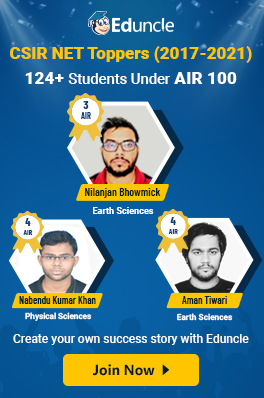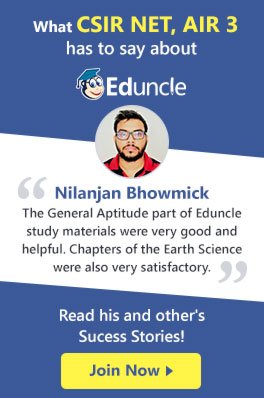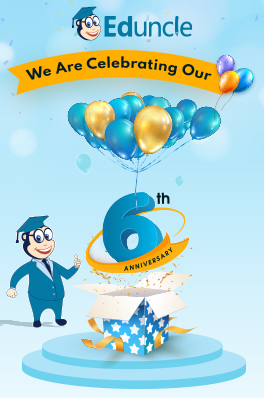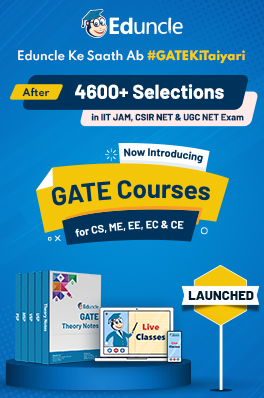
Life is a little tangled for Junior Research Fellows (JRF) in pioneer research institutes in India. This noble profession is not only about research but also offers many other opportunities.
Let's explore the destination & career path of doctoral students & JRF with Manudeo N. Singh.
Manudeo N Singh, a PhD scholar in the Department of Earth Science, IIT Kanpur, working on the spatio-temporal hydro-geomorpho-dynamics of North Bihar Wetlands shared his candid work experience with Eduncle.
In this blog, we have put some interview highlights with Mr. Manudeo N.Singh and his career journey.
When did he start preparing for CSIR NET?
Life as a Research Scholar in IIT
About his Projects and Developments
His Preparation Strategy for CSIR NET
Success Mantra for Exam Aspirants by Mr. Manudeo
Tell Us About Yourself...
I'm a PhD scholar in the Department of Earth Science, IIT Kanpur since August 2013. I'm working on the spatio-temporal hydro-geomorpho-dynamics of North Bihar Wetlands with a special focus on the largest wetland of the area, Kaabar Tal.
I have done M.Sc in Disaster Management from Pondicherry University, Port Blair (Andaman) Campus in 2013.
In 2011, I got my B.Sc. degree in Physical Science from Hansraj College, University of Delhi. I must mention that I did not study Geology or Earth Sciences in my B.Sc. I had been exposed to this field of study during my M.Sc (although at elementary level) and got fascinated with this.
Despite not being from this field, I decided to pursue for my career in Earth Science, which till now is proving to be the right decision.
When did you Start Preparing for CSIR NET?
First time I appeared for December 2012 CSIR NET exam. It was on the 22nd or 23rd of December. explicitly because the preparations were already going on, although in latent form, during the normal M.Sc. course period.
What I mean to say is, the M.Sc. syllabus was already covering the CSIR NET Syllabus in some manner, and studying for M.Sc. was in fact a preparation for NET in a long run.
| Download Free CSIR NET Material for All Subjects [Trusted & Recommended by 4600+ Selected Students] |
| Updated Syllabus for All Subjects |
| Sample Theory Notes |
| Model Test Papers with Solution (Part A, B & C) |
| 5 Previous Exam Papers with Answer Keys |
| Complete Study Plan for Part A |
| Paper Analysis by Eduncle Experts |
| Personalized Guidance by Subject Experts |
How did you get Inspiration to Prepare for JAM & NET Exams?
As I mentioned earlier, I did my M.Sc. from Port Blair, which is the capital of Andaman & Nicobar Islands.
In one way or another, this island inspired me to further pursue Earth Sciences. I was always drawn towards research, right from my childhood.
Nature always fascinated me, big time! National Geographic and Discovery were my favorite channels. The serene and untouched Andaman Islands gave me raw pique in the natural wonders.
There, I was seeing what people only learn in the Earth Sciences textbooks. This place inspired me to learn the earth system processes, and here I am.
How is Your Life As a Research Scholar in IIT Kanpur?
The research in IIT Kanpur is quite different from other similar institutions. The pre-registration conditions are tough. The coursework demands not sweat, but blood. However, I survived all these, rather decently, and now I'm in my fourth year. If you want to do research and nothing else, IITK is the place for you.
Usually, hostel-messes are infamous for their food, luckily, I'm in a hostel (or rather Hall, here hostels are called as Halls) which is famous for its good food (It's not so good if you ask me!).
IITK provides a PC and a sitting space to all its scholars. Usually, Profs are good and professional and they don't interfere in students' personal life.
He is one of the best-known figures and an excellent researcher in the Indian river-science domains. Prof. Rajiv Sinha
Overall, life is good here!
Download Free Study Plan & Boost your Learning
About Your Recent Developments & Projects
Recently, I have published two research papers, both in international journals. Their details are as follow:
Singh, Manudeo, S. K. Tandon, and Rajiv Sinha. "Assessment of connectivity in a water?stressed wetland (Kaabar Tal) of Kosi?Gandak interfan, north Bihar Plains, India." Earth Surface Processes and Landforms (2017).
Sinha, Rajiv, Shivika Saxena, and Manudeo Singh. "Protocols for riverine wetland mapping and classification using remote sensing and GIS." CURRENT SCIENCE, VOL. 112 , NO. 7 (2017).
While the first paper is on a rather new concept in the hydro-geomorphic systems: 'the connectivity concept', the second paper depicts a rather easy method to classify and map the water-bodies in Indo-Gangetic Plains.
I have also presented my studies in few conferences, of which worth mentioning is the EGU General Assembly 2016 (Vienna, Austria). There I presented research as detailed below:
Singh, Manudeo, Rajiv Sinha, and Sampat K. Tandon. "A conceptual model for quantifying connectivity using graph theory and cellular (per-pixel) approach." In EGU General Assembly Conference Abstracts, vol. 18, p. 305. 2016.
Currently, I'm working on an idea of utilizing the wetlands for the flood-attenuation and flood-management services in the north Bihar plains, which are highly prone to flood hazards. The results are expected to be published soon.
What was Your Study Routine During CSIR NET Preparation?
Frankly, I have never been an early riser but always been a night-crawler.
So, I used to start my studies at 11 or 12 in the daytime and used to study for 2 hours followed by a 30 min break, which was again followed by a 2-hour study shift.
I never sacrificed my sleeping hours and always slept for the whole 8 hours. Some power-naps in-between the breaks also helped a lot.
What are Some Tips that You Want to Share with CSIR NET Aspirants?
Usually, they test your comprehension, concept grasping powers, and research aptitude in the NET exams. Most questions are based on basic concepts.
Here, I do like to share that although the NET is meant for the M.Sc. passed students, most of its questions can be solved by grasping the concepts taught in the B.Sc. syllabus.
I never studied any M.Sc. level book during my preparations but rather polished the basics and fundamentals from the B.Sc. textbooks. I would like to share that the notes of a USA Professor (Stephen N. Nelson) at Tulane University helped me a lot.
His notes are concise and to the point. They are available on his homepage.
The key to success is, Revision! Revise a lot. I used to read the whole textbook once or twice a day. Yes, it becomes easier and faster after 4-5 reads.
Also, buy a good MCQ (Multiple Choice Questions) practice book. You will be surprised to know that it can help a lot. And yes, you cannot complete the whole NET syllabus as it comprises of a lot of study areas. It's best to focus on your strong areas.
Apart from Research, What Entices You the Most?
I'm a traveler and a writer. I love to travel, one of the reasons I chose this field of study. I write mostly on political topics.

I also love to watch English TV series (mainly drama, Sci-Fi, crime) and love to listen to science-related podcasts (mostly of BBC). Listening to shortwave radios (language does not matter) is also one of my hobbies.
The journey to learning never stops. This scholar is highly ambitious about his learning goals. With strong determination, he conquered the journey of CSIR NET, which perhaps is the first step towards a career in R&D.
If this story inspired you, then share with us what you felt aroused in you.
We would appreciate if you would pen down a few thoughts on this inspiring story. Share your opinions in the Comments Section below.
Thank You!





















